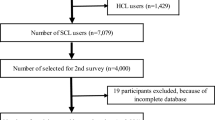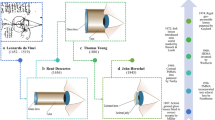Abstract
The aim of this study was to delve into the acceptability of smart contact lenses, to understand their viability on the market. We identified that the technology is being developed but the reaction it will have on potential buyers is not yet known. To achieve this, the Unified Theory of Acceptance and Use of Technology (UTAUT) model was used and adapted to an online questionnaire that was answered by 200 people, from Portugal (106) and Colombia (94). Considering that one is from Latin America and the other from Europe, two countries in opposite continents and with different cultures and contexts, the main hypothesis is that there will be a difference in the acceptance of smart contacts lenses between Portugal and Colombia. Additionally, it was hypothesized that people would be scared of using smart contact lenses and would be focused on the negative potential of the new product, like the lack of privacy. The main results did not reveal statistically relevant differences between the two countries (significant difference was found just for the Social Influence construct). Considering the whole sample, the results show that people tend to not be ready for smart contact lenses in their everyday life yet, but they are open to the idea of using them in specific situations that could help them improve their lives and work (healthcare, information), which is a great opportunity for interaction design.
Access this chapter
Tax calculation will be finalised at checkout
Purchases are for personal use only
Similar content being viewed by others
References
Amirparviz, B., Ho, H., Saeedi, E.: US 8096654 B2. U.S. (2012)
Kim, T., Hwang, S., Kim, S., Ahn, H., Chung, D.: US2016/0091737A1. U.S. (2016)
Fridin, M., Belokopytov, M.: Acceptance of socially assistive humanoid robot by preschool and elementary school teachers (2014)
He, J., Mc Carley, J., Crager, K., Jadliwala, M., Hua, L., Huang S.: Does wearable device bring distraction closer to drivers? Comparing smartphones and Google Glass. Appl. Ergon. 70, 156–166 (2018)
Heerink, M.: Exploring the influence of age, gender, education and computer experience on robot acceptance by older adults. In: Kahn, P., Adams, J., Trafton, J. (eds.) 6th International Conference on Human Robot Interaction 2011. LNCS, pp. 147–148. ACM/IEEE, Lausanne (2011)
Heerink, M., Krose, B., Evers, V., Wielinga, B.: Responses to a social robot by elderly users. In: International Conference on Intelligent Robots and Systems 2008, pp. 2724–2724. IEEE/RSJ, Nice (2008)
Heerink, M., Kröse, B., Wielinga, B., Evers, V.: Influence of social presence on acceptance of an assistive social robot and screen agent by elderly users. Adv. Robot. 23(14), 1909–1923 (2009)
Heerink, M., Kröse, B., Wielinga, B., Evers, V.: Assessing acceptance of assistive social agent technology by older adults: the almere model. Int. J. Soc. Robot. 2, 361–375 (2010). https://doi.org/10.1007/s12369-010-0068-5
Mubin, O., et al.: Using child–robot interaction to investigate the user acceptance of constrained and artificial languages. In: Avizzano, C.A., Ruffaldi, Emanuele, E. (eds.) 19th International Conference on Robot and Human Interactive Communication 2010, RO-MAN, pp. 588–593. IEEE, Viareggio (2010)
Park, J., et al.: Soft, smart contact lenses with integrations of wireless circuits, glucose sensors, and displays. Sci. Adv. 4(1), eaap9841 (2018)
Santino R.: Tecnologia no seu olho: saiba o que lentes de contato inteligente podem fazer, Olhar digital (2019)
Senior, M.: Novartis signs up for Google smart lens. Nat. Biotechnol. 32(9), 856 (2014)
Tay, B.T.C., Park, T., Jung, Y., Tan, Y.K., Wong, A.H.Y.: When stereotypes meet robots: the effect of gender stereotypes on people’s acceptance of a security robot. In: Harris, D. (ed.) EPCE/HCII 2013. LNCS (LNAI), vol. 8019, pp. 261–270. Springer, Heidelberg (2013). https://doi.org/10.1007/978-3-642-39360-0_29
Venkatesh, V., Morris, M., Davis, G., Davis, F.: User acceptance of information technology: toward a unified view. MIS Q. Manage. Inf. Syst. 27(3), 425–478 (2003)
Westby T., Bloms, E., Bengston, S., McMullan, P.: US2019/0043291A1. U.S. (2018)
Yu, M., Zhou, R., Wang, H., Zhao, W.: An evaluation for VR glasses system user experience: the influence factors of interactive operation and motion sickness. Appl. Ergon. 74, 206–213 (2019)
Zaad, L., Allouch, S.B.: The influence of control on the acceptance of ambient intelligence by elderly people: an explorative study. In: Aarts, E., et al. (eds.) AmI 2008. LNCS, vol. 5355, pp. 58–74. Springer, Heidelberg (2008). https://doi.org/10.1007/978-3-540-89617-3_5
Author information
Authors and Affiliations
Corresponding author
Editor information
Editors and Affiliations
Rights and permissions
Copyright information
© 2022 The Author(s), under exclusive license to Springer Nature Switzerland AG
About this paper
Cite this paper
Santiago, E., Polo, D., Rebelo, F., Casais, M., Vilar, E., Noriega, P. (2022). Are We Ready for Smart Contact Lenses?. In: Martins, N., Brandão, D. (eds) Advances in Design and Digital Communication II. DIGICOM 2021. Springer Series in Design and Innovation , vol 19. Springer, Cham. https://doi.org/10.1007/978-3-030-89735-2_27
Download citation
DOI: https://doi.org/10.1007/978-3-030-89735-2_27
Published:
Publisher Name: Springer, Cham
Print ISBN: 978-3-030-89734-5
Online ISBN: 978-3-030-89735-2
eBook Packages: EngineeringEngineering (R0)




